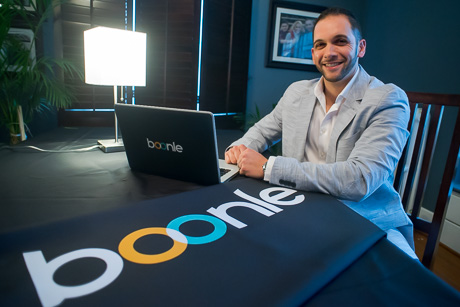Startup founder hopes to hop on the 'gig economy' rocket ship

A Le Roy resident has a fledgling tech startup he thinks has a chance to get big.
Billion dollar big,* he doesn't know, but he sees an opportunity and he's going for it. (*In the venture-capital investing world. a "unicorn" is a company with a billion-dollar valuation, and a "rocket ship" is a company that is growing fast.)
A couple of months ago, after much planning Antonio Calabrese launched Boonle, a site where aspiring graphic artists and other creative types can find entry-level projects and start building a resume.
The concept is aimed at college students and new graduates, but anybody entering the workforce as a freelancer might find the site helpful, Calabrese said.
Small businesses without Madison-Avenue-type promotional budgets, as well as other startups, might also gravitate to the site for the chance to tap into some talent at little or no cost.
According to his research, the freelance market, also called the "gig economy" in today's digital parlance, is expected to become 40 percent of the nation's workforce in coming years.
That's just a huge opportunity for a business like Boonle.
"I think we can harness a lot of that market because that's the newbie market, when things are starting out, and we plan on being that first stepping-stone for those entering the freelance market," Calabrese said. "I think we can own a big chunk of that."
So far, Calabrese, the company's sole owner and founder, has raised $100,000 in seed funding and is starting the search for another round of early-stage investors with a goal of raising from $500,000 to $1.5 million.
There's a lot of marketing needed to help get the word out about Boonle, especially on college campuses. He's hoping to complete a partnership deal soon with RIT, where he graduated from, and other colleges. He recently received applications from 25 students at universities around the nation willing to sign on as brand ambassadors to help sign up would-be freelancers.
Calabrese came up with the idea for the business when he realized how hard it is for graduates who have yet to establish a professional portfolio to find work, and that there are a lot of smaller businesses that can't afford the rates experienced freelancers and agencies charge.
He acknowledges he's gotten a little criticism from those who think a site like Boonle lowers the fees digital designers and developers can charge, but he counters that the businesses that would pay more, and the designers who would charge more, aren't part of Boonle's target market.
"There is plenty of work to be done on projects that pay more," Calabrese said. "Those are the jobs that are still going to go to those with the skills to get higher-paying jobs."
Creative categories on the site range from logos and brochures to writing and photography and even music production. Basically, if you're a creator, you should be able to find a market for your work on Boonle.
"We're a platform to help people build a platform so they can eventually launch a career," Calabrese said.
Those looking for work set the price for the job, from free to something a bit more pricey, and then freelancers look at the job, decide if it's within their skill level, if the price is right for them at that stage, and then accept the assignment.
The potential employer has the option to reject the freelancer and the job goes back into the marketplace.
"The business can set the job for free if they don't have the budget for it, but the chances of it getting worked on go down if you set it for free," Calabrese said.
If a business hires a particular freelancer, or several of them, they can present future projects to their pool of trusted freelancers, but the job goes out to the whole site if it isn't picked up within 48 hours.
On jobs that are paid, Boonle handles the transactions through PayPal, taking about a 30-percent cut, with a third of that covering PayPal's transaction fees.
In a future update, freelancers will be able to upgrade their accounts, once they've proven themselves, and get exclusive access to higher-paying jobs and avoid the fee being taken out for a small monthly subscription.
It's Calabrese's intention to keep his business based in Western New York. He's from Rochester with a lot of strong ties there, including ties to the tech-startup investing community, but he thinks as the business grows, wherever it's based in WNY, he won't have a hard time recruiting employees.
He said that while he was at RIT, a lot of students expressed an interest in staying in the area, even those not from here originally, but the kind of jobs they've been trained for are just in short supply in the area.
"When you're getting job offers from Google, Apple, LinkedIn and Facebook, who wants to stay in Rochester then?" he said. "But if there's a cool company here, and the cost of living is a lot less and we can still pay them somewhat competitive rates, then I think they would stay here."
